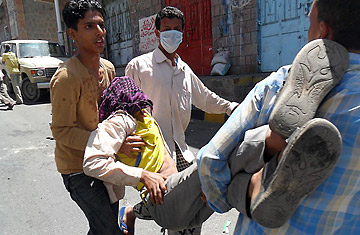
A Yemeni demonstrator is carried away after being wounded on the second day of clashes in the city of Taiz.
Even before the blasts of gunfire rang out, antigovernment protesters marching in Taiz, Yemen, knew that Monday was going to be different. They had seen the men milling ominously on the rooftops that lined the street. It was a repetition of an image from two weeks ago, when snipers killed 52 demonstrators from atop buildings in the capital Sana'a — one that has weighed heavily on the minds of Yemen's opposition.
In a flash, the thousands-strong march would scatter into the city streets amidst clouds of tear gas and a hail of bullets, coming from uniformed police forces on street level and plainclothes thugs perched above. "They must have planned this attack," said Noah al-Awlafi, a demonstrator. "Because they stopped the march on the way back to Freedom Square. We had already left the governor's building when baltageya [thugs] and security started shooting right at the crowds." Many were shot in the neck and chest, he said.
For more than seven weeks, Taiz, Yemen's most populous province, has been home to the country's largest anti-regime demonstrations. As in the capital, Sana'a, protesters calling for the end of Ali Abdullah Saleh's 32-year reign have erected a sprawling town of tents in the center of the city. But Monday's violence was the most brutal attack in Taiz, and the second most lethal assault on demonstrators in Yemen since demands for the president's resignation began in January.
Dr. Sadeq al-Shujah, working at a mosque-turned-field hospital at Taiz's Freedom Square demonstration area, confirmed 11 deaths and over 200 injuries from gunshot wounds. Hundreds more were treated for the effects of the tear gas. Taiz governor Hamoud Khaled Soufi was quoted by the state-run news agency, Saba, as saying that protesters attacked the governor's building and that security forces did not fire directly at protesters.
The regime's sharp return to violence comes amidst mounting pressure from the international community to reach a solution to the country's political deadlock. Yemen is a key U.S. ally in the fight against Al-Qaeda, and administration officials have said that the prolonged uncertainty of Saleh's regime is likely to harm security by creating opportunities for extremists.
Washington has been in a precarious position as it tries to balance security interests while respecting the right of demonstrators to demand change in the country, where more than 35 percent are unemployed and 40 percent live below the poverty line. But recently, the U.S. has appeared to endorse the prospect of Saleh's departure. "President Saleh has publicly indicated his willingness to engage in a peaceful transition of power and we believe the timing and form of that transition should be accomplished through dialogue and negotiation. So we urge that process to continue," White House Press Secretary Jay Carney said on Monday.
On Sunday, the six-member Gulf Cooperation Council issued a statement strongly advocating leaders throughout the country to negotiate a settlement to the two-month long turmoil. In recent days, negotiations between Yemen's government and the opposition, overseen by the US and EU, have come to a standstill. One government official insists, however, that the talks are continuing.
But Saleh, emboldened by two consecutive weeks of massive pro-regime demonstrations, appears unmoved by the growing calls to transfer power. "A few weeks ago it looked like Saleh was about to step down, and now he has regrouped and is continuing to hold on," says Gregory Johnsen, a Yemen expert at New Jersey's Princeton University. "The fact is that he's still in power, and what he has done has really worked. He's not willing to step down yet and his last few speeches have been very explicit about that."
Speaking to supporters on Monday, Saleh was adamant about his position. "We are standing firm, and we will defend constitutional legitimacy by all means. We will stand as firm as mountains and will remain faithful to the people." Saleh has accused those calling for his ouster of working outside the bounds of the constitution.
Late Saturday, the Joint Meeting Parties, a coalition of opposition parties, drafted a five-point plan for the handover of executive powers to Saleh's deputy, Vice President Abdrabuh Mansur, who, according to the constitution, would inherit the presidency temporarily in the event of Saleh's departure. The proposal additionally called for the restructuring of the country's expansive security apparatus, currently controlled by Saleh's sons and nephews. The President has not responded to the proposal.
For Saleh, whose grip on power outside the capital appears to be quickly unraveling, the window of opportunity for a peaceful transition may be coming to a close as protesters, frustrated with the lack of progress in negotiations, leave their demonstration areas and take to the streets. "The longer that President Saleh contines to cling to power without any sort of a a clear transition plan, the more worrisome this is for Yemen's immediate future," says Johnsen.
